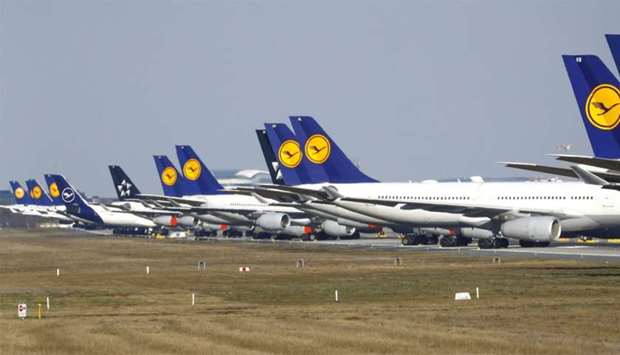The highly competitive European aviation market is now witnessing a peculiar type of competition as government-backed aid is now targeted at some specific airlines, which are struggling amidst the worst peacetime crisis plaguing the global air transport industry.
Covid-19 lockdowns have led to an almost complete standstill in airline travel worldwide. Many airlines have grounded almost all their flights, globally.
Recently, Germany announced a €9bn rescue package for its carrier Lufthansa following the coronavirus pandemic that has pushed several struggling airlines over the edge.
Earlier this month, the European Commission approved France's €7bn state aid package for Air France-KLM.
The European Union (EU) generally prohibits national governments from providing financial aid to homegrown companies because it distorts competition within the single market. But rules have since been loosened as the coronavirus lockdown threatens businesses.
Lufthansa’s owners need to agree to the bailout, which includes Germany taking a 20% stake in the carrier and the injection of €5.7bn in non-voting capital.
But the vote is not expected to take place unless the EU has signed off on the rescue deal.
Low-cost carrier Ryanair challenged Germany’s €9bn rescue package for Lufthansa and France's €7bn state aid package for Air France-KLM, arguing it “distorted competition”.
“If you are putting in place these rules so the Germans can subsidise only Lufthansa or the French can subsidise only Air France KLM, it is discriminatory and in breach of state aid rules,” Ryanair chief executive Michael O’Leary said.
The government-backed aid will allow the two carriers to “engage in below-cost selling” and make it harder for Ryanair, its Laudamotion subsidiary and rival low-cost carrier easyJet to compete, O’Leary said.
“Ryanair will appeal against this latest example of illegal state aid to some European airlines, which will massively distort competition,” O’Leary said recently.
O'Leary argues airlines don't need state aid and that payroll support schemes across Europe — that see governments step in and pay employees' salaries to prevent firms firing them — are sufficient to stay afloat.
Instead of governments treating all airlines equally, they are massively subsidising the state aid carriers like Lufthansa and Air France, he complains.
However, the head of the International Air Transport Association, which mainly represents traditional network airlines but not their biggest low-cost rivals like Ryanair, defended the reliance on government aid, saying it was an “exceptional” response to the crisis.
“It is understandable to avoid a collapse of this sector,” IATA director general and CEO Alexandre de Juniac noted.
For its part, Lufthansa is hoping for a quick nod from the European Commission for the bailout package, industry analysts say.
The EC has already asked Lufthansa to waive landing rights for six out of 300 planes in total at Frankfurt and Munich airports, where the German airline has a two-thirds market share.
The number of planes and corresponding numbers of airport slots can differ as planes on short-haul flights may have five to six slots a day compared to just one for planes on long-haul.
Lufthansa has some 760 aircraft, although its chief executive Carsten Spohr said that 100 of these will remain grounded due to lower demand following the Covid-19 pandemic.
Meanwhile, the European Commission defended its temporary change to state aid, telling Euronews it has ensured "that measures taken are necessary, proportionate and appropriate to contribute to the objective pursued by the Member State."
"Member States are subject to monitoring and reporting obligations to the Commission on the implementation of State aid measures," it added.
EC also said it has put forward "concrete proposals to allow companies in the sector to start focusing on their much-needed recovery" including a temporary modification to air carrier licensing rules.
In total, governments around the world have promised $123bn of support — mainly in debt — to airlines, predominantly in the United States and Western Europe, industry data crunched by Reuters have shown.
Since the EU's Internal Market for Aviation was born back in 1992, there has certainly been a revolution in air travel. Air travel in Europe is now cheaper, safer and open to more people than ever before.
What's more, because of a comprehensive set of EU passenger rights, travellers can have full confidence they will be looked after on their journey.
This is all thanks in no small part to a European Union initiative to replace a series of national rules by a single set of EU rules, known as the EU Internal Market for Aviation.
Competition brought major changes to air travel – changes that have propelled European mobility forward, successfully helping to bring Europeans closer together, and providing solid foundations for more jobs and a robust economy.
Undoubtedly, the single aviation market has opened the doors to a wide variety of destinations within Europe. People and businesses are today more free than ever to enjoy all the opportunities that continental Europe provides.
But then it can be realised only in an ecosystem of fair competition and a level playing field.
*Pratap John is Business Editor at Gulf Times. Twitter handle: @PratapJohn.


